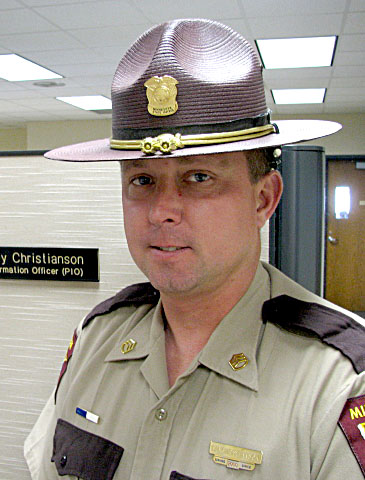
Question: I purchased an old trailer to haul my Ranger around. Are brakes required on it?
Answer: Brakes are required on all trailers with a gross weight of 3,000 pounds or more. Trailers manufactured after June 30, 1988, with a gross weight of 3,000 pounds or more require brakes installed on all wheels.
Every trailer with a gross weight of more than 3,000 pounds shall also be equipped with a breakaway brake device which will automatically apply and hold the brakes should the trailer accidentally become detached from the towing unit.
Trailers manufactured prior to July 1, 1988, that are equipped with three or more axles are not required to have brakes on the front axle, provided the brakes on all other wheels meet the performance standards prescribed by law.
The manufacturers of many new vehicles equipped with anti-lock brake systems require any towed unit be equipped with electric brakes and the towing vehicle be equipped with an electronic brake controller.
It’s also important to check the brakes on your personal vehicle every three months. Too often, vehicle owners put off simple maintenance until it’s too late. Deteriorating brakes can create longer stopping distances, ultimately leading to a crash. Do your part to maintain your vehicle to avoid a crash.
Question: I called in a driving complaint of a possible drunk driver and received a call back and was told the driver was tired. Can the driver be cited for this?
Answer: Yes, the drowsy driver could be cited for inattentive driving, and additional serious charges could be incurred if the drowsy driver causes a crash. A drowsy driver is an unsafe driver. Lack of sleep negatively impacts performance. It slows reaction time, impairs judgment, situational awareness and increases lapses in attention and risk taking.
According to a study by the AAA Foundation for Traffic Safety, people who sleep 6 to 7 hours a night are twice as likely to be involved in a crash as those sleeping eight hours or more. People sleeping less than five hours increase their risk four to five times.
Before hitting the road be sure to:
•get a good night’s sleep. While this varies, the average person requires about 8 hours of sleep a night.
•schedule regular stops.
•avoid alcohol and medications (over-the-counter and prescribed) that may impair your driving. Alcohol interacts with fatigue, increasing its effects – just like drinking on an empty stomach.
While on the road be alert for warning signs of fatigue, for example, drivers who:
•can't remember the last few miles driven.
•drift from their lanes or hit a rumble strip.
•experience wandering or disconnected thoughts.
•yawn repeatedly.
•have difficulty focusing or keeping their eyes open.
•tailgate or miss traffic signs.
•have trouble keeping their head up.
If you recognize warning signs:
•never count on the radio, open windows or use other "tricks" to keep them awake.
•respond to symptoms of fatigue by finding a safe place to stop for a break.
Surviving the holiday season this year can be as simple as driving smart by staying alert, slowing down, paying attention, planning a sober ride and always buckling up.
If you have any questions concerning traffic-related laws or issues in Minnesota, send your questions to Sgt. Troy Christianson – Minnesota State Patrol at Statue 169.791 2900 48th Street NW, Rochester MN 55901-5848. (Or reach him at, Troy.Christianson@state.mn.us)



